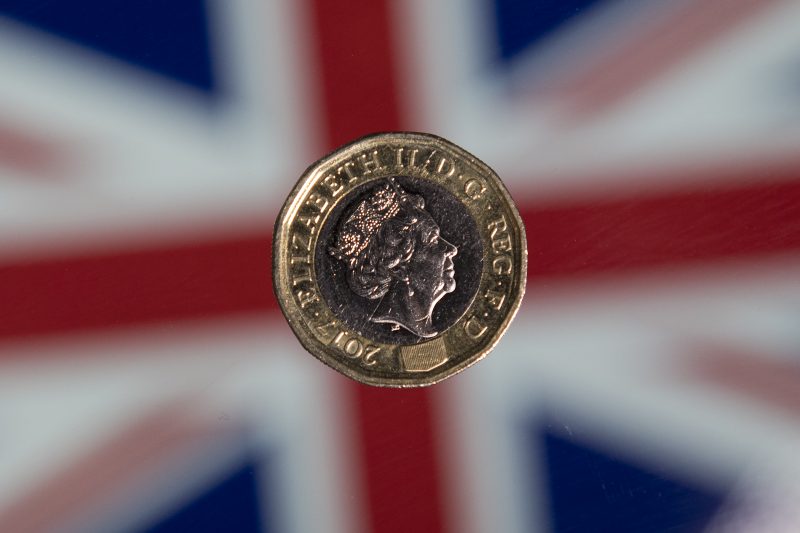Asian markets mostly up but Huawei, trade war loom large
The pound is wallowing around four-month lows ahead of another vote on Theresa May’s Brexit deal next month that is expected to fail for a fourth time (Justin TALLIS)
Hong Kong (AFP) – Asian markets mostly rose Tuesday but concerns about the Huawei row and broader China-US trade war kept investors on edge, with analysts warning the crisis could rumble on for some time.
Regional investors were spooked by a sharp drop in New York’s tech-rich Nasdaq after Google said it was beginning to sever ties with the Chinese telecoms giant, days after Donald Trump’s decision to bar it from the US market and put it on a sales blacklist.
The Huawei development — with the US citing national security concerns — has muddied the waters in the tariffs stand-off between Washington and Beijing, which was thought to have been close to conclusion at the start of the month.
And now some observers are warning that stalled talks between the economic superpowers might not see any progress before a hoped-for meeting between Trump and China’s Xi Jinping at the G20 in June.
“The market was a little optimistic that a trade deal would just get done here this month,” Brett Ewing, chief market strategist at First Franklin Financial Services, told Bloomberg News.
Dealers have “definitely come to terms with a longer term trade negotiation process”.
While the Commerce Department issued a 90-day reprieve on the ban on dealing with Huawei, saying breathing space was needed to avoid huge disruption, the two appear to be digging their heels in.
And on Monday China’s envoy to the European Union called the Huawei move “wrong behaviour”, adding “there will be a necessary response”.
Zhang Ming warned: “Chinese companies’ legitimate rights and interests are being undermined, so the Chinese government will not sit idly by.”
The developing crisis had a mixed impact on Asia’s tech firms, with Samsung Electronics, a rival to Huawei in the smartphone market, rallying 2.7 percent.
Analysts say the US ban will damage Huawei’s ability to sell phones outside China, offering Samsung a chance to consolidate its position at the top of the global market.
But in Tokyo, Sony shed more than four percent and Sharp was off 2.5 percent, while Taiwanese chip giant TSMC shed 1.7 percent.
– Pound suffers again –
“As trade wars hurt demand in the US and China, Asian electronics manufacturers will feel considerable pain, in our view,” Tieying Ma, an economist at DBS Group, said.
After an initial sell-off, Shanghai’s composite index ended more than one percent higher, with some observers concurring with Huawei boss Ren Zhengfei that the firm could absorb the impact of the ban.
“The global telecom supply chain can still work perfectly without the US suppliers,” said Sun Jianbo, president of China Vision Capital Management in Beijing.
“China and US are unlikely to allow the worst-case scenario, which involves putting up trade barriers on all fronts, as it will mean great losses for both parties. So the worst possible case may have been priced” into markets.
Sydney rose 0.4 percent, Seoul added 0.3 percent and Taipei was 0.7 percent higher, with Manila, Mumbai, Bangkok and Jakarta all in positive territory.
But Tokyo ended down 0.1 percent, Hong Kong dropped 0.5 percent and Wellington closed off 0.2 percent.
In early trade London rose 0.3 percent, Paris added 0.2 percent and Frankfurt put on 0.6 percent.
“The US-China trade war is in danger of assuming Brexit-like characteristics — long and drawn out with a series of false dawns, but with no discernible progress made after a lot of emotional noise,” said OANDA senior market analyst Jeffrey Halley.
On currency markets the pound fell again and remains lodged around four-month lows against the dollar as Prime Minister Theresa May struggles to get opposition Labour backing for her Brexit deal, meaning it is likely to fail on her fourth attempt to pass it through parliament next month.
There is growing concern May will step down if she loses again, leaving the path open for a hardliner who is keen for a no-deal divorce, which many experts say will be economically destructive.
Australia’s dollar sank 0.6 percent against the greenback after central bank officials hinted at an interest rate cut to record lows when it holds its policy meeting next month.
Oil prices rose after major producers said supplies were sufficient and stockpiles still rising, but gains were capped by the China-US tensions.
– Key figures around 0720 GMT –
Tokyo – Nikkei 225: DOWN 0.1 percent at 21,272.45 (close)
Hong Kong – Hang Seng: DOWN 0.5 percent at 27,657.24 (close)
Shanghai – Composite: UP 1.2 percent at 2,905.97 (close)
London – FTSE 100: UP 0.3 percent at 7,335.66
Pound/dollar: DOWN at $1.26.95 from $1.2725 at 2050 GMT
Euro/dollar: DOWN at $1.1156 from $1.1165
Dollar/yen: UP at 110.15 yen from 110.04 yen
Oil – West Texas Intermediate: UP 23 cents at $63.33 per barrel
Oil – Brent Crude: UP 13 cents at $72.10 per barrel
New York – Dow: DOWN 0.3 percent at 25,679.90 (close)
Disclaimer: Validity of the above story is for 7 Days from original date of publishing. Source: AFP.


